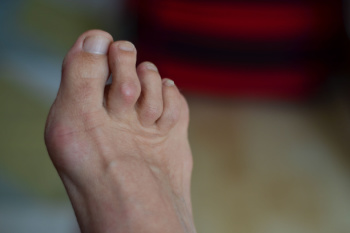
Hammertoe and claw toe are common toe deformities that can cause discomfort and affect mobility. A hammertoe bends abnormally at the middle toe joint, resembling a hammer. A claw toe bends upward at the joint where the toe meets the foot and downward at the middle and end joints, creating a claw-like shape. Symptoms include toe pain, stiffness, corns, calluses, and difficulty wearing shoes. Claw toes may also cause pain in the ball of the foot. These conditions can worsen over time, if not treated. Prevention includes wearing shoes with a wide toe box, avoiding high heels, and doing regular toe stretches. Treatment ranges from padding, orthotics, and splints to targeted exercises or, in severe cases, surgery to correct the deformity. If you notice persistent toe pain or changes in toe shape, it is suggested that you schedule an appointment with a podiatrist. Early intervention can relieve symptoms, slow progression, and help avoid more invasive procedures later on.
Hammertoe
Hammertoes can be a painful condition to live with. For more information, contact one of our podiatrists from Foot & Ankle Medical Center . Our practitioners will answer any of your foot- and ankle-related questions.
Hammertoe is a foot deformity that affects the joints of the second, third, fourth, or fifth toes of your feet. It is a painful foot condition in which these toes curl and arch up, which can often lead to pain when wearing footwear.
Symptoms
- Pain in the affected toes
- Development of corns or calluses due to friction
- Inflammation
- Redness
- Contracture of the toes
Causes
Genetics – People who are genetically predisposed to hammertoe are often more susceptible
Arthritis – Because arthritis affects the joints in your toes, further deformities stemming from arthritis can occur
Trauma – Direct trauma to the toes could potentially lead to hammertoe
Ill-fitting shoes – Undue pressure on the front of the toes from ill-fitting shoes can potentially lead to the development of hammertoe
Treatment
Orthotics – Custom made inserts can be used to help relieve pressure placed on the toes and therefore relieve some of the pain associated with it
Medications – Oral medications such as anti-inflammatories or NSAIDs could be used to treat the pain and inflammation hammertoes causes. Injections of corticosteroids are also sometimes used
Surgery – In more severe cases where the hammertoes have become more rigid, foot surgery is a potential option
If you have any questions, please feel free to contact our offices located in Nampa and Fruitland, ID . We offer the newest diagnostic and treatment technologies for all your foot care needs.
